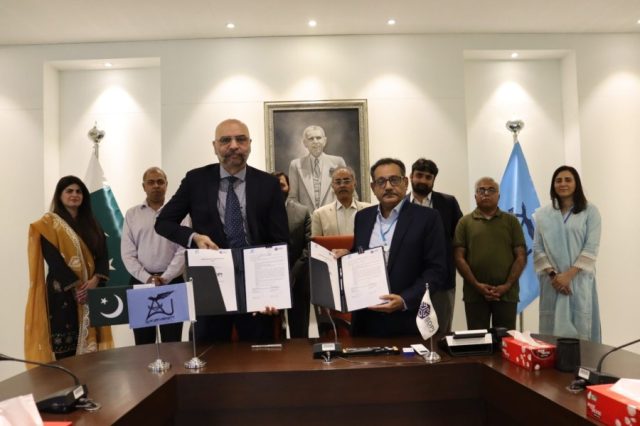ISLAMABAD, Friday, June 20, 2025 (WNP): The Sustainable Development Policy Institute (SDPI) and Air University (AU) Islamabad signed a Memorandum of Understanding (MoU) on Friday, laying the foundation for enhanced collaboration in key areas including sustainability, policy research, knowledge exchange, and institutional development.
The agreement was signed by Dr. Shafqat Munir Ahmad, Deputy Executive (Policy) at SDPI, and Air Commodore (R) Fawad Zahir, Director of the Office of Research, Innovation and Commercialization (ORIC) at Air University. The signing ceremony, held at AU’s campus, brought together senior representatives from both institutions.
The SDPI delegation included Moazzam Sharif Bhatti, Director Advocacy & Campaigns; Ahad Nazir, Associate Research Fellow; and Romila Qamar, Associate Managing Editor (Research). The Air University team comprised Dr. Salman Hassan Khan, Director of Quality Enhancement Cell (QEC); Dr. Sohail Iqbal, Chair of the Department of DMAE; Dr. Usama Qazi, Chair of the Department of GS; Lt. Col (R) Amir Toor, Deputy Director QEC; Mehreen Ishtiaq, Assistant Director QEC; and Kinza Ayaz.
The ceremony opened with the screening of a documentary showcasing Air University’s academic achievements and research contributions. In his remarks, Dr. Salman Hassan Khan reaffirmed the university’s commitment to academic excellence and productive institutional collaboration.
Dr. Shafqat Munir welcomed the partnership, expressing SDPI’s keen interest in working closely with AU to foster evidence-based policymaking and embed sustainable development principles in national discourse.
Under the MoU, both institutions agreed to collaborate on a broad range of initiatives, including joint research projects, training programs, faculty and student exchanges, policy dialogues, and capacity-building efforts.
The partnership aims to bridge the gap between academic research and public policy by fostering mutual exchange of expertise, resources, and actionable insights. Both sides expressed confidence that the collaboration would contribute meaningfully to Pakistan’s development landscape by nurturing innovation, informed debate, and inclusive policy design.




